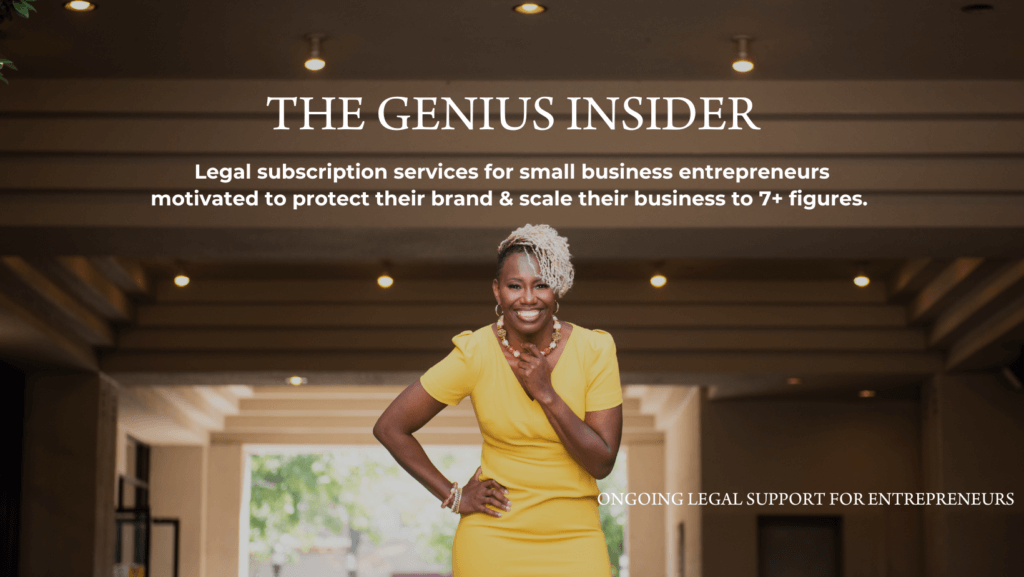Hey, geniuses, what’s up? Coming back with you with another episode of the Own Your Genius podcast. We’ve had some good episodes over this summer and I cannot believe that summer’s almost over. I cannot believe that we are almost in August. Like what happened to the year? We were literally just saying happy new year and now my kids are giving me their Christmas list. Crazy bananas. Anyway.
Let’s talk about what we’re going to talk about today. So a couple of weeks ago, I think it was two weeks ago, maybe episode 127, I can’t recall. But that’s when we were talking about. Twitter, Threads, Spill, that whole thing, how Elon Musk had threatened to sue Metta because they hired former employees from Twitter who may have access to trade secrets. And we talked a little bit then about how to, like things you need to consider when you’re going from employee to entrepreneurship.
But today, today what we’re gonna talk about is just making that transition, like five actual steps that you can take to transition from employee to entrepreneur with confidence. So I think it’s gonna be a really good podcast cause when you’re taking that leap, when you’re taking that leap from working from someone, having that consistent paycheck, knowing that you have sick days and I’m going to say, quote unquote, “stability and reliability.” And I say quote unquote, because these jobs today are not like our parents’ jobs back in the day when you would have a job, they took care of you, you had a pension, and you will work that job and you’ll work till you retire. These jobs now have no, they have no loyalty. I would say, but for many people that are working at nine to five, it is reliable for that time that you are working at nine to five. And when you make that decision to become an entrepreneur, you’re leaving that reliability behind.
So making that leap can be exhilarating, but challenging. And while that path may be uncertain, the preparation and a significantly increase your chances of success and boost your confidence. So today we’re going to explore five actual steps to help you navigate this transition with confidence and pave the way for a prosperous entrepreneurial venture. Are you ready?
The first thing you need to do to prepare for entrepreneurship is research, honey. You need to do your market research. You need to understand the market that you wish to enter. Understaning the market that you wish to enter is the cornerstone of any successful business. Researching the market involves gathering relevant data, analyzing trends, identifying target audiences, and evaluating potential competitors. This step is crucial because what it does is it enables you to identify the gaps or the opportunities in the market, redefine your business idea and then align your offerings with the needs and the preferences of the people. Because if you’re not serving the people, you don’t have a business.
A couple of things you can do to help you with market research is take advantage of your online resources. Resources such as Google Trends and Keywords, they are so helpful. You can go to those websites and you can see what people are searching for. You can see what’s hot in the market. So you can see if there’s a pain point for the good or service or if there’s a pain point that your good or service can help fill. Things like industry reports and surveys help you gain insight into your chosen market segment. And it can help you understand your customers’ pain points, their preferences, and even their purchasing behavior. Wouldn’t you want to know that before you step into entrepreneurship?
You also need to identify your unique selling proposition. You’ll hear people call it USP. And what I want to tell you is don’t be discouraged if you find when you’re doing your market research and you find that the market is saturated with busineses offering the same goods or services as you.
Here’s the gag. Most markets are saturated. What you have to do is differentiate yourself and your business by offering what your unique value proposition is. What sets you apart from your competitors? You really have to think back. You really need to sit back and think about what is it that really makes you different. Why should someone choose me to help them with their trademarks versus another law firm?
And I’m going to answer that question. Since you asked, we’re going to answer that question. One of the things that I found by researching the market is that when someone goes outside of our firm to hire an attorney, it can take weeks for them to get the trademark clearance search and application. When you work with us, we perform a trademark clearance search within two business days. And we’ll have your application file within one business day if there are no conflicts. So one of the things that sets us apart, what makes us unique is how fast we’re able to get this work done for you. And I know that’s something that my people really appreciate.
Okay, so the first thing, first actual step was research market.
The second is to review your employee contracts and handbooks. Now we talked about that back in episode 127, when we were talking about the whole Twitter, Threads, Spill situation. But before diving into entrepreneurship, we need to review your current employee contracts and your handbooks. So not just your contract, but also your handbooks to understand any restrictions or clauses that can affect your transition. And the reason I say handbooks, because sometimes they won’t give you just a flat out contract, right? You have companies that give you a handbook, they want you to read it, and then they want you to sign it, that you’ve read the handbook and that you agree to what’s in the handbook. So, to try to get you. So you also want to check not just your contracts with your handbook to make sure that you know what’s going on. And we discussed what to look for back in that episode 127 that I told you about. But it’s essential to be aware of non-compete agreements, intellectual property clauses, and any potential conflicts of interest. Nor the legal implications of your departure will help you navigate the transition smoothly and ethically.
And here’s how you accomplish this step.
Reach out to Human Resource to make sure you have every document that you sign. You can seek advice from attorneys that specialize in employment law to understand the legal aspects of your transition, to help you go over your contract with you and your other documents to make sure that you’re doing everything that you are supposed to do. You can check for non-compete clauses, identify any clauses in your contract, and determine what that scope is and what that duration is and what type of restrictions that you have. They can restrict your ability to start a business in a similar industry or a geographical area. You need to know that.
And then honor your obligations. Ensure to fulfill all your contractual obligations to your current employer. Maintaining professionalism through this transition is really key. And a lot of people like, well screw my employer, right? But guess what? Do you get ready to be an employer? How would you feel if your employer or your employee move the same way as you are moving. Like the energy, I believe that the energy that you put out is the energy you’re going to receive. So don’t do any shady stuff.
The third thing that you can do when you’re transitioning from employee to entrepreneur is know your numbers. Financial preparedness is extremely important when transitioning from employee to entrepreneur. Understanding your financial situation, including how much you have saved, what your monthly expenses are, and the funds needed to sustain your lifestyle and business is crucial for a smooth transition. And here’s what you’re gonna do to approach step number three. First things first, create a personal budget. Detail your monthly expenses, including housing, utilities, groceries, debts, and other essential costs. And if you can, build an emergency fund. Another thing you can do is estimate what those startup costs are gonna look like. When you’re knowing your numbers, how much it costs to run your business is very important. So calculate the initial investments required for your business, including equipment, inventory, marketing, operational experience, expenses. How much money do you need to run your business when you first start? And then you wanna monitor your cashflow. You wanna keep a close eye on your business cashflow, ensuring that you have enough to cover both personal and business expenses, and that you’re not just out here all willy-nilly buying things that aren’t necessary.
The fourth step to transitioning is a well-crafted business plan. Because it’s a roadmap that outlines your business goals, your strategies, your target audience, and your financial projections like we just talked about, and even marketing plans. Writing a business plan helps you clarify your vision, assess the feasibility of your business idea, and secure potential investors or in financing if that’s what you need. Make sure you include these following things to have a compelling business plan. First, you wanna have an executive summary. What that’s gonna do is provide a concise overview of your business idea and its value proposition. Then you wanna have the market analysis. You gotta make sure that you present the results of your market research and demonstrate a deep understanding of the industry and your target market. You wanna know what your operational strategy is, so you wanna outline your business structure, your key team members and operational processes. I know we talked about market analysis, but you also wanna have a part about marketing and sales. You wanna explain what your marketing and sales approach is gonna be to attract customers and generate revenue. So you see the difference. You have the analysis that’s gonna tell you what the market looks like, and then you have marketing and sales that tells you how you’re gonna put yourself in that market. And finally, and most importantly, I believe, is the financial projections. You have to include realistic financial projections such as income statements, balance sheets, and cash flow forecasts to demonstrate the viability of your business. I know that the most challenging part of writing the business plan is knowing what to include. I wrote a book a few years ago, the Launch Legally Business Plan Workbook, for this exact reason. It takes the guesswork out of writing your own business plan. It’s available on Amazon. We’ll make sure we leave the links in the show notes and what I’ll tell you too is even if you’re not trying to get financing for your business even if you plan on funding this business yourself a business plan can be very beneficial. I mean what don’t you want to know how much it costs to run your business? Don’t you need to know how you’re going to reach the people in the market and what your sales approach is going to be? Don’t you need to know what the market already looks like? And it’s one thing to know it and I’ll tell you this and then I’ll move on to the fifth point.
It’s one thing to know and just have an idea in your head, but it’s a whole another thing to write it out. And that’s how I was in the beginning stages of my business. Like I knew I had an idea, but I never wrote it down. So I never had anything to refer back to. And it was never real, I guess that’s what I will say. But once I started writing things down, honey, that’s when the magic happened. And it wasn’t anything fancy and it wasn’t, you know, 20, 30 pages long or 40 pages long. They even have things now called the one page business plans, they even have those now. But the important part is making sure that you’re not starting this business as why I should. Like you have to have some idea of what you’re stepping into, especially if your goal is to leave your nine to five and do this full time. All right, I’m stepping off my soap box now.
The fifth and final thing for this podcast, because you can always do more, but these are five that I thought were really important as you’re making that journey and that transition from employee to entrepreneur. This last thing is to build your business on the side. Transitioning from employee to entrepreneur does not have to be an all or nothing type of move. Building your business on the side while you’re still employed allows you to validate your business idea, build your customer base, and gain confidence before fully committing. And here’s how to make this step successful. Baby, time. Time management. You have to set aside a dedicated time each week to work in your business without neglecting your, not only your job responsibilities, but also your personal responsibilities. And you have to be consistent with it, whether it’s early in the morning or late at night. I had to say no to some things in order to get it done. Start small. Begin with the minimal viable product, MVP, or a service to test the market without overwhelming yourself. And MVP, what that refers to is the simplest version of a product or service that contains only the core features and functionalities. And the primary goal of this MVP is to quickly validate the product’s viability in the market with minimal effort and money.
You also want to get out and network and collaborate. You need the people. And this is coming from someone who hasn’t done the best job of peopleing. I tell folks all the time, I don’t people much, but I’m starting to people now and I’m seeing the effect that it’s having on my business. So you want to make sure that you’re attending industry events and networking opportunities to connect with potential customers and partners. And you need to be, because you’re still working your day job. You need to be very selective and strategic about the peopling that you do. Don’t say yes to everything just because you’re like, “Oh, you know, this is the opportunity.” I just had this conversation with one of my NAWBO is a National Association of Women Business Owners. We have membership throughout the United States and I’m a part of the Alabama chapter. I’m actually, I’m proud of this. I’m actually the Alabama chair for advocacy. So I’m really excited to work with the state legislation on bills and laws that are affecting business owners and letting my people know. So yeah, I’m excited about that. But anyway, we were just talking about the other day how we have to know and be strategic about which opportunities we attend.
You have-honestly, that comes again from knowing your market. So you’ll know that if someone invites you to do X, Y, Z, but that X, Y, Z isn’t your target audience. They don’t like to spend money or whatever it is. Matter of fact, a good example was one of the ladies at the NAWBO monthly meeting, she said she would go to, what did she say? Craft shows. So she’s an artist and she would attend craft shows because she would get invited and she would been there. But she found that was not the best part the best place for her because at those craft shows people aren’t looking to buy art. They’re looking to buy things to create art with and little craft things. They’re not looking to spend and invest in art. So those are things that you need to know to make sure that you are peopling at the right place.
And then what you want to do is because you’re building this business on the side is don’t take that money that you get from the business and put it into your pocket. Reinvest it. Reinvest any of that initial profits into your business to help it grow steadily.
I like those steps. I think that today’s podcast, I hope we’re taking notes. I think there were a lot of takeaways and definitely some actionable steps because transitioning from employee to entrepreneur is a significant step and it requires thoughtful planning and preparation by researching the market, reviewing your employee contracts, understanding your financials, writing a comprehensive business plan, and building your business gradually. You’ll be well equipped to embark on your journey. Well equipped to handle your entrepreneur journey with confidence.
But remember this, remember that entrepreneurs, remember that entrepreneurship involves risk, but with dedication and well thought out strategy, you can turn your passion into a thriving business venture. I definitely believe that. Tell me, what do you think? If you have your own business, what did you do? How did you transition from employee to entrepreneur? Was it so unsteady to do any of the things that we talked about today?
I want to know in the comments, and if you’re thinking about coming into entrepreneurship, if you’re thinking about transitioning from employee to entrepreneur, what are you going to do? What are some of the things that you’re going to do to make that easier? I want to know.








Responses
I loved this episode! It is so timely for me. It confirms some things I knew but need to commit to. Also made me aware that I need to better pinpoint my unique value proposition and highlight it as I develop my marketing. I’d love for you to do an episode on the best way to approach choosing insurance options for those planning the employee to self-employed transition. I appreciate your genius!
I am so glad this episode was valuable for you. Your UVP is key to creating your mark in your market. Will absolutely do a podcast on choosing the right insurance. Thank you for the suggestion! I appreciate you listening and engaging with us.